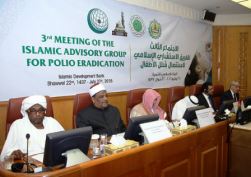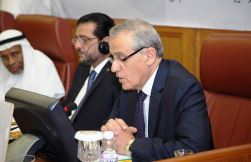Muslim leaders look to expand group’s role
 5 August 2016 – The Islamic Advisory Group for Polio Eradication (IAG) adopted a new work-plan last week to help in the final push to end polio in the last 2 Muslim countries where the virus remains in circulation – Afghanistan and Pakistan. The announcement came at the conclusion of the third annual IAG meeting held at the Islamic Development Bank’s headquarters in Jeddah. During the meeting, the Group also expressed its intention to expand its role by supporting other immunization initiatives and programmes that benefit maternal and child health.
5 August 2016 – The Islamic Advisory Group for Polio Eradication (IAG) adopted a new work-plan last week to help in the final push to end polio in the last 2 Muslim countries where the virus remains in circulation – Afghanistan and Pakistan. The announcement came at the conclusion of the third annual IAG meeting held at the Islamic Development Bank’s headquarters in Jeddah. During the meeting, the Group also expressed its intention to expand its role by supporting other immunization initiatives and programmes that benefit maternal and child health.
Ambassador Mohammed Naeem Khan, Assistant Secretary General of the Organisation of Islamic Cooperation (OIC), for Science and Technology, spoke at the meeting of the criticality of IAG support for anti-polio efforts in the final stages of eradication. He also stated that building on the successful experience in improving polio immunization services, the IAG is “now well placed to further help promote health care in Muslim countries which still carry a heavy burden of preventable causes of mortality and morbidity”.
Progress to eradicate polio has been hindered in Afghanistan and Pakistan due to misperceptions surrounding polio vaccine and lack of safe access to children for vaccination. In both countries, engagement with local religious scholars in giving support and protection to the frontline health workers has had positive results, reducing the number of vaccination refusals.
Deputy of Al-Azhar Al Sharif, Dr Abbas Shouman, said that these misperceptions generally arise due to fatwas issued by non-specialists prohibiting vaccine, and spoke specifically of his organization’s efforts to tackle misinformation.
“It is the duty of Al-Azhar AlSharif to explain the truth to people and clarify the facts,” he said. “Through its many awareness programs it [Al Sharif] has to explain that vaccination as a form of preventive treatment against disease is a manifestation of the purposes behind Islamic law which aim to protect lives and offspring,” he added.
In a statement issued at a press conference after the event, the IAG reiterated its “trust in the safety and effectiveness of all routine childhood vaccinations as a life-saving tool which protects children”, and acknowledged that vaccination fully conforms to Islamic principles and rulings. The Group also affirmed the religious obligation of Muslim parents to vaccine their children as an extension of their duty to keep them healthy.
 WHO’s Regional Director for the Eastern Mediterranean Dr Ala Alwan was present at the meeting and thanked the IAG for its support in the fight against polio. Alwan also commended the governments of Afghanistan and Pakistan for their tireless work in seeking to end polio transmission by the end of 2016.
WHO’s Regional Director for the Eastern Mediterranean Dr Ala Alwan was present at the meeting and thanked the IAG for its support in the fight against polio. Alwan also commended the governments of Afghanistan and Pakistan for their tireless work in seeking to end polio transmission by the end of 2016.
The IAG was launched in 2013, its core membership made up of the International Islamic Fiqh Academy, Al-Azhar Al Sharif, the Islamic Development Bank, and the Organisation of Islamic Cooperation. Leaders of these organizations, as well as other religious scholars, technical experts and academics from the Muslim world participated in the meeting.
Related links
International Islamic Fiqh Academy
Organisation of Islamic Cooperation
Images from the third annual IAG meeting, Islamic Development Bank’s headquarters, Jeddah (Flickr)


